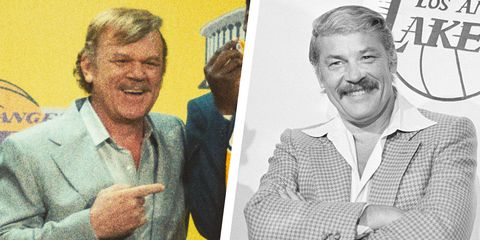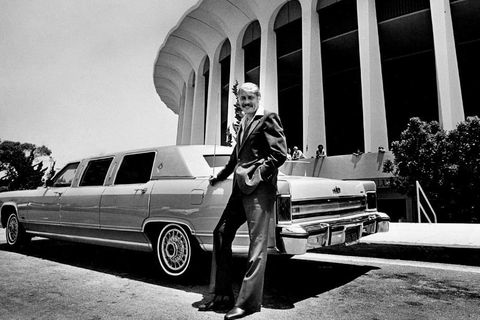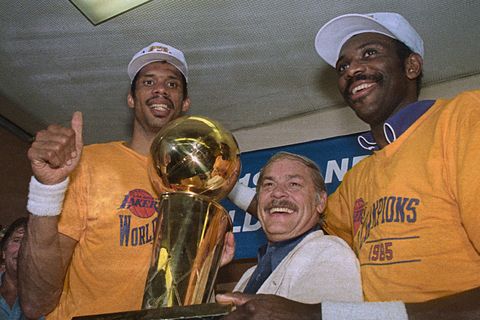Magic Johnson wasn’t looking forward to watching it. No one from the Los Angeles Lakers, past or present, have publicly supported it. But, whether they like it or not, HBO’s new series, Winning Time: The Rise of the Los Angeles Lakers, is bringing Jerry Buss’ Showtime Lakers of the 1980s back into the cultural zeitgeist with stories so wild there’s only one reaction: Did that actually happen?
Based on Jeff Pearlman’s 2014 bestseller Showtime: Magic, Kareem, Riley, and the Los Angeles Lakers Dynasty of the 1980s, the HBO series spends ten hour-long episodes exploring the debauchery and success of the era of Lakers basketball largely responsible for saving the NBA from irrelevance. The series premiere alone will leave you in disbelief. Did Jerry Buss really take a 19-year-old Magic Johnson to the Playboy Mansion? Yes. Did Magic Johnson really tell Buss he wanted to return to college instead of joining the Lakers? Maybe, but not likely.
The series premiere centers on two stories: Buss purchasing the Los Angeles Lakers from Jack Kent Cooke and Buss wooing Magic Johnson to the team from college. Dr. Jerry Buss is played with calm, cool by John C Reilly, and he pulls strings, calls in favors, and tells a few expensive white lies to own the crown jewel of California’s basketball world. With Caddyshack‘s Michael O’Keefe playing Cooke and newcomer Quincy Isaiah playing Magic Johnson, Winning Time portrays the Lakers’ sale as an expensive start of a new era. Still, the show only tells part of the story of the transaction that changed basketball forever.
Here’s the true story of how Buss got his hands on the Lakers and how much Winning Time gets right.
Did Jerry Buss pay as much for the Los Angeles Lakers as he did on Winning Time?
In Winning Time, Lakers owner Cooke was eager to sell the team to pay a divorce settlement so large it broke a Guinness World Record. For most of the series premiere, Buss is scrambling to get the rest of the $67.5 million he and Cooke agreed on for the sale of the team. Unfortunately, while Winning Time got the $67.5 million sale price right, it got the purchase slightly wrong. Buss got more than just the only NBA team in Los Angeles at the time, the real estate mogul’s purchase also included an NHL team in the Los Angeles Kings, The Forum—the arena where the Lakers and Kings played—as well as a 13,000 square foot ranch in California Sierras, according to a New York Times article about the sale from May 29, 1979.
By the time Buss purchased the Lakers, the team had already won its first NBA title in Los Angeles in 1972, acquired arguably the best player in the NBA in Kareem Abdul-Jabbar, and had Jack Nicholson courtside at games exuding his trademark maniacal charm and terrifyingly irresistible smile. But, the NBA was failing. Attendance and ratings were plummeting months before Buss purchased the team, with national television ratings dropping by a backboard breaking 26% from the previous year. N0 one was paying $67.5 million for a team in a league some thought was on the verge of going out of business. In fact, the Lakers accounted for less than half of the final sale price, as the team and the Kings together were sold for just $24 million, according to Buss himself in the New York Times article. The other $43.5 million was for the indoor arena and the ranch.
The gamble worked out historically well for Buss. The $24 million he purchased for the Lakers and Kings would be $95.57 million in today’s money. 43 years later, the combined purchase of both teams would be a fraction of the Lakers’ current valuation of $5.5 billion. If there’s one thing Winning Time got absolutely correct about Buss, it’s how shrewd of a businessman he was in his heyday.
“I didn’t make a fortune betting on the sure thing. I made it buying low, and selling high,” Buss says to the camera in the series premiere.
How did Jerry Buss make his money?
Before Buss was frequenting the Playboy Mansion as the owner of the most popular team in the NBA, he amassed a fortune in real estate. In the 1950s, Buss worked as an operations consultant and theoretical chemist at aerospace firms helping build missiles after receiving a master’s degree and a doctorate in physical chemistry from the University of South California. As he told Johnson in Winning Time, Buss left the field after realizing he’d rather “build things than blow them up.” What he didn’t tell his star player in the show was that his epiphany led him to partner with a coworker named Frank Mariani to begin purchasing real estate.
On July 1, 1959, the pair purchased their first property, and by the time Buss purchased the Lakers in May 1979, their company, Mariani-Buss Associates, owned 700 properties in Arizona, California, and Nevada. Buss’s net worth was estimated at $50 million at the time of the Lakers sale, and his company had real estate holdings valued at a total of $500 million. In the show, half of Buss’s purchase of the Lakers was paid by signing over ownership of his properties to Cooke.
Buss made his fortune in real estate, and it was his 20 years of experience in the field that helped start his new life as the owner of the Lakers, which would overshadow anything he’s ever done in his life.
Were the Lakers the first professional team Jerry Buss owned?
Dr. Buss is synonymous with The Lakers, but the first professional team Buss owned in Los Angeles didn’t shoot hoops and avoided nets. Years before becoming the owner of the Lakers, Buss was unable to buy any sports franchises in the Los Angeles area, until he purchased World Team Tennis franchise the L.A. Strings, according to a May 1979 profile on the multimillionaire real estate investor. Since it’s safe to assume most people today have no recollection of World Team Tennis, you can assume what happened to Buss’s investment. The league folded in 1978, a year before his career-defining Lakers purchase, and after Buss lost between $4 million and $5 million.
With Johnson’s HIV announcement, the Lakers’ epic rivalry with the Boston Celtics, and more Jerry West outbursts littered throughout the Showtime Lakers’ history, Winning Time will surely blur the line between exaggeration and reality in upcoming episodes.
This content is created and maintained by a third party, and imported onto this page to help users provide their email addresses. You may be able to find more information about this and similar content at piano.io





Comments are closed.